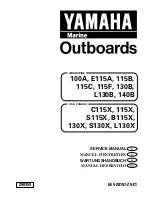
1 8
2.9 Onboard Headers and Connectors
Onboard headers and connectors are NOT jumpers. Do NOT place
jumper caps over these headers and connectors. Placing jumper caps
over the headers and connectors will cause permanent damage of the
motherboard!
Connector
Figure
Description
FDD Connector
(33-pin FLOPPY1)
(see p.9, No. 18)
Note: Make sure the red-striped side of the cable is plugged into Pin1 side of the
connector.
Primary IDE Connector (Blue)
Secondary IDE Connector (Black)
(39-pin IDE1, see p.9, No. 8)
(39-pin IDE2, see p.9, No. 9)
Note: If you use only one IDE device on this motherboard, please set the IDE
device as “Master”. Please refer to the instruction of your IDE device vendor
for the details. Besides, to optimize compatibility and performance, please
connect your hard disk drive to the primary IDE connector (IDE1, blue) and
CD-ROM to the secondary IDE connector (IDE2, black).
USB 2.0 Header
ASRock I/O
TM
accommodates
(9-pin USB45)
4 default USB 2.0 ports. If
(see p.9, No. 12)
those USB 2.0 ports on the
I/O panel are not sufficient,
this USB 2.0 header is
available to support 2
additional USB 2.0 ports.
Infrared Module Header
This header supports an
(5-pin IR1)
optional wireless transmitting
(see p.9, No. 24)
and receiving infrared module.
IDE1
PIN1
IDE2
PIN1
FLOPPY1
Pin1
connect the black end
to the IDE devices
connect the blue end
to the motherboard
the red-striped side to Pin1
80-conductor ATA 66/100 cable
USB_PWR
USB_PWR
P+5
P-5
P+4
P-4
GND
GND
DUMMY
1
DUMMY
GND
+5V
IRTX
IRRX
1
Internal Audio Connectors
These connectors allow you
(4-pin CD1, 4-pin AUX1)
to receive stereo audio input
(CD1: see p9, No. 25)
from sound sources such as
(AUX1: see p.9, No. 26)
a CD-ROM, DVD/ROM, TV
tuner card, or MPEG card.
CD-R
GND
GND
CD-L
AUX-R
GND
GND
AUX-L
CD1
AUX1















































